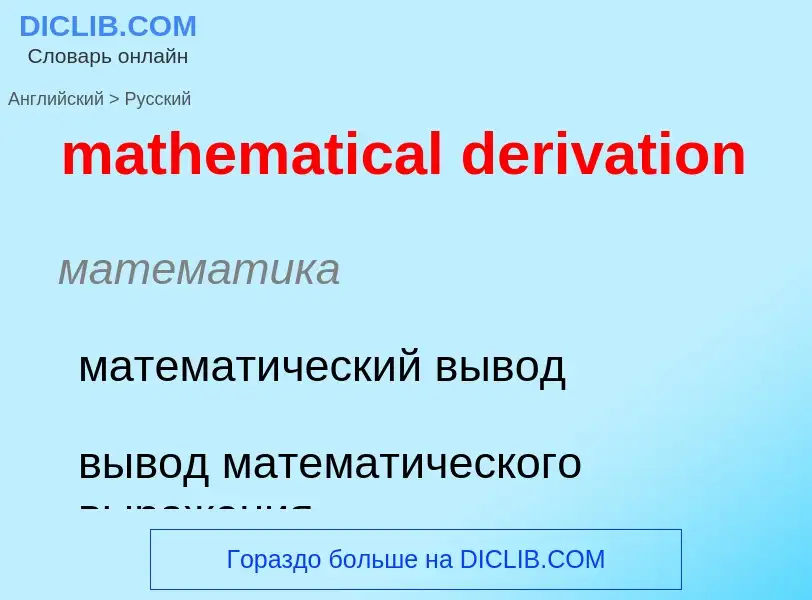Перевод и анализ слов искусственным интеллектом ChatGPT
На этой странице Вы можете получить подробный анализ слова или словосочетания, произведенный с помощью лучшей на сегодняшний день технологии искусственного интеллекта:
- как употребляется слово
- частота употребления
- используется оно чаще в устной или письменной речи
- варианты перевода слова
- примеры употребления (несколько фраз с переводом)
- этимология
mathematical derivation - перевод на русский
математика
математический вывод
вывод математического выражения
математика
математическое доказательство
математика
геометрическое доказательство
математика
метод доказательства
математика
антидифференцирование
математика
математический прибор
математика
формальное доказательство
математика
теоретическая статистика
математика
специалист по математической статистике
Определение
Википедия

A mathematical proof is an inferential argument for a mathematical statement, showing that the stated assumptions logically guarantee the conclusion. The argument may use other previously established statements, such as theorems; but every proof can, in principle, be constructed using only certain basic or original assumptions known as axioms, along with the accepted rules of inference. Proofs are examples of exhaustive deductive reasoning which establish logical certainty, to be distinguished from empirical arguments or non-exhaustive inductive reasoning which establish "reasonable expectation". Presenting many cases in which the statement holds is not enough for a proof, which must demonstrate that the statement is true in all possible cases. A proposition that has not been proved but is believed to be true is known as a conjecture, or a hypothesis if frequently used as an assumption for further mathematical work.
Proofs employ logic expressed in mathematical symbols, along with natural language which usually admits some ambiguity. In most mathematical literature, proofs are written in terms of rigorous informal logic. Purely formal proofs, written fully in symbolic language without the involvement of natural language, are considered in proof theory. The distinction between formal and informal proofs has led to much examination of current and historical mathematical practice, quasi-empiricism in mathematics, and so-called folk mathematics, oral traditions in the mainstream mathematical community or in other cultures. The philosophy of mathematics is concerned with the role of language and logic in proofs, and mathematics as a language.


![Visual proof for the (3,4,5) triangle as in the [[Zhoubi Suanjing]] 500–200 BCE. Visual proof for the (3,4,5) triangle as in the [[Zhoubi Suanjing]] 500–200 BCE.](https://commons.wikimedia.org/wiki/Special:FilePath/Chinese pythagoras.jpg?width=200)


